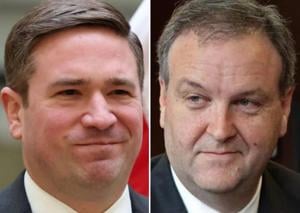
MINNEAPOLIS — For 57,000 Minnesotans, the 2024 general election has special significance: It’s the first presidential election in which they can cast a ballot. Minnesotans with convicted felonies who are not currently incarcerated became eligible to vote this June, restoring an estimated 57,000 votes to Minnesota’s voter roll. ADVERTISEMENT The bill marks the state’s largest expansion of voting rights since the age of voting was lowered to 18 in 1971, according to the Secretary of State’s Office .
Minnesota law previously required those convicted of a felony to complete their sentence before regaining the right to vote. Parole lengths can vary, so, for some, this meant five years out of prison without voting. For others, it meant much longer.
Now, the law says “if you’re out, you can vote.” “We deemed you to be safe and able to be back in the community and replanted and reintegrated back into society. You can have a job, you can pay taxes, but we’re telling you that you could not participate in our democracy and choose the individuals that represented you?” said Cedrick Frazier (D-New Hope), who sponsored the bill during its passing.
“People that wanted to restore the votes believed that wasn’t fair.” Path to passage The bill has been 20 years in the making — passing through the desks of Attorney General Keith Ellison, Rep. Ray Dean and Sen.
Bobby Joe Champion before Frazier brought it forward in the 2024 session, when the “Restore the Vote” legislation passed. “I was just the last leg of this relay race, and I was able to get across the finish line, but not without all the people that did the work the years before that,” Frazier said. ADVERTISEMENT Although Frazier picked up the bill at its tail end, he said he was keeping track of the Restore the Vote Movement for many years and was familiar with the goals behind the legislation.
“Many states put in place laws that then made it possible that, when you were a felon, you would lose your right to vote, as a way to maintain that subjugation of Black folks and their ability to participate in a democracy,” he said. Frazier said that while people of color make up about 20% of the state’s population, according to the Minnesota State Demographic Center, they disproportionately represent incarcerated people. In 2017, the ACLU found Black people specifically accounted for 30% of incarcerated individuals , while making up 6% of Minnesota’s population.
In all of the years that the bill was brought to the Legislature but didn’t pass, Frazier said he saw resistance come most often from Republicans and during times of divided government. When the DFL trifecta of a blue governor, Senate and House came in 2022, he said he knew it was time to push this bill. “I think that people, when people think about folks that have been convicted of felonies, they think are probably about the worst case scenarios of individuals, right? They think about folks that may have done some of the most egregious things,” Frazier said.
“But the reality is, it could be your neighbor that you think is the nicest person in the world, and you have no idea that that person may have a felony for something like fraud.” Widespread impact Secretary of State Steve Simon held a press briefing on Tuesday, Oct. 29, to raise awareness of the newly restored rights and get the word out ahead of the Nov.
5 general election. Simon said at the briefing that 55,000 votes is a substantial number in local elections and that Minnesota has had an election every year that was decided by one or two votes. In 2016’s presidential election, Donald Trump lost Minnesota by 44,593 votes.
ADVERTISEMENT Frazier said some Republicans believed that people with felonies would all end up voting blue, though Frazier said this reasoning wasn’t often stated publicly. “There’s nothing to back up how individuals are going to vote, but there is a lot to back up the positive net gain impacts that are had when you give someone their voting rights back,” he said. Simon also spoke about some of the “net gain” impacts Frazier mentioned for the community when these votes are restored.
“This is really good for everybody, not just the person involved, but the rest of the community,” Simon said. “We know that if a person feels invested, a person feels a sense of ownership in the community, in the city, in the state, that they are far, far less likely to re-offend, and that benefits everyone involved, all families in Minnesota.” Frazier said that during his door-knocking this fall, people would sometimes open the door and say they can’t vote because they’re felons.
“We’re like, ‘We changed that, we fixed it!’ ” Frazier said. “You can actually participate in democracy. At first, they don’t believe you right away.
So we often, we can pull it up online or on our phone, and show on it, and then ...
to see the kind of eyes light up that is still, that still catches me, you know, every time.” Getting to work Brian Fullman, one of the main activists behind the Restore the Vote legislation and a formerly incarcerated individual, shared at Tuesday’s press briefing that his efforts now surround awareness and dispelling misinformation on the rights of those who have a criminal history. ADVERTISEMENT “For so many years, I didn’t even think I could vote,” he said.
“This is about our brothers and sisters who are now entering society, but it’s also about our brothers and sisters who’ve been walking around with the wrong messaging and misinformation about how they can use their voices publicly.” Fullman said he started becoming more involved in his community after finding out he was eligible to vote. He said having the right to vote directly impacts the feelings of hopelessness and cynicism within the Black community.
“I started to really have a positive approach in the community when I understood that I was a first-class citizen and not somebody that needs to be patted on the head and say, ‘Wait your turn, your voice is not valuable yet,’ ” Fullman said. Minnesota is one of 20 states, including neighboring North Dakota, to pass similar legislation, Simon explained at Tuesday’s briefing. The bill had one major challenge when the Minnesota Voters Alliance took the law in front of the Minnesota Supreme Court in August.
After a district court dismissed the challenge, the Supreme Court unanimously ruled the same and upheld the “Restore the Vote” legislation..














